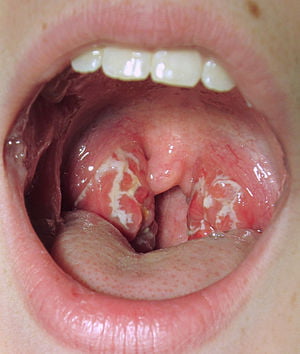Tonsillectomy in Türkiye
Surgical tonsillectomy is a surgical procedure during which the tonsils are removed in order to treat recurrent tonsillitis, to treat troubled breathing during sleep, in addition to other problems related to enlarged tonsils, and to treat rare tonsil diseases.

Why is tonsillectomy performed?
Tonsillectomy to treat:
- Recurrent, chronic or severe tonsillitis.
- Complications of enlarged tonsils.
- tonsil bleeding
- Other rare tonsil diseases.

tonsillitis
The tonsils are the first line of defense for the immune system against bacteria and viruses that enter through the mouth, but this function exposes the tonsils to infection and inflammation, and the function of the immune system in the tonsils declines after puberty, a factor that may be responsible for rare cases of tonsillitis in adults.
This procedure is recommended if:
- The bacterial infection causing tonsillitis does not improve with antibiotic treatment.
- Tonsil abscess does not improve despite drug treatment.
Complications of enlarged tonsils:
The tonsils are likely to swell after repeated or persistent infections, so tonsillectomy can be used to treat the following problems:
- difficulty breathing.
- Disordered breathing during sleep ( obstructive sleep apnea ).
Diseases or other conditions affecting the tonsils
Tonsillectomy can be used to treat rare diseases or conditions such as:
- Cancerous (malignant) tissue in one or both tonsils or suspected malignancy .
- Frequent bleeding from blood vessels near the surface of the tonsils.
- Severe bad breath associated with fissured tonsils.
Dangers of tonsillectomy:
Tonsillectomy , like other surgeries, carries some risks :
Reactions to anesthesia: Anesthesia causes minor, short-term complications such as headache , nausea, vomiting, or muscle soreness and rarely, serious, long-term problems.
Swelling: Swelling of the tongue and soft roof of the mouth can cause breathing problems, especially during the first few hours after the operation.
Bleeding during surgery: In rare cases, severe bleeding is possible during surgery, requiring additional treatment and a longer hospital stay.
Bleeding during healing: Bleeding can occur during healing, especially if the scabs come off early.
Infection : Rarely, surgery may lead to an infection that requires further treatment.
Steps to prepare for a tonsillectomy:
The patient will receive instructions on how to prepare for the operation or how to prepare their baby. Information that will be asked to be provided includes the following:
- All medications, including over-the-counter medications and nutritional supplements, are taken regularly.
- Personal or family history of adverse reactions to anesthesia.
- Personal or family history of bleeding disorders.
- Known allergy or adverse reactions to medications such as antibiotics.
Preparation instructions include:
- You may be asked to stop taking certain medications or change your medication doses several days before surgery.
- Stop eating after midnight before surgery
- Make arrangements to return home .
What to expect:
Tonsillectomy is performed on an outpatient basis and the patient can go home on the day of surgery
during the procedure

The procedure begins with placing the patient under general anesthesia, i.e. the patient will not be conscious and will not feel any pain during the surgery. The surgeon then cuts out the tonsils using a scalpel or a specialized surgical instrument that uses heat, high-energy heat, or sound waves to remove or destroy tissue and stop the bleeding. .
after the procedure
Common problems after tonsillectomy include:
- Moderate to severe sore throat for one to two weeks.
- Pain in the ears , neck or jaw .
- Nausea and vomiting for a few days.
- Mild fever for several days.
- Bad breath for up to two weeks.
- Swelling of the tongue or throat.
- Feeling of something stuck in the throat.
- Anxiety or sleep disorders in children .
Steps to manage pain and promote a good recovery include the following
Medication : Pain relievers should be taken as directed by your surgeon or hospital staff.
Fluids : It is important to get plenty of fluids after surgery to avoid dehydration.
Lunch : Eat bland foods that are easy to swallow, such as applesauce or broth, add foods such as ice cream and candy, and avoid acidic, spicy, tough, or crunchy foods that may cause pain or bleeding.
In addition to:
- Bed rest
- Avoid strenuous activities such as running and cycling for two weeks after surgery.
You should contact the doctor if:
Bleeding : In the form of small spots of dark blood from the nose or in the saliva, but any bright red blood requires a trip to the emergency room.
Fever : 38.9°C or higher.
Dehydration: Signs of dehydration include decreased urination, thirst, weakness, headache, dizziness or lightheadedness.
Breathing problems : Snoring or noisy breathing is common during the first week of recovery, but if you have difficulty breathing, you should contact your doctor.

Tonsillectomy in Türkiye:
The medical staff of surgical teams, doctors and consultants in REHABTÜRK can provide the best treatment options and free consultations – by striving to keep abreast of the latest medical technologies and methods.

